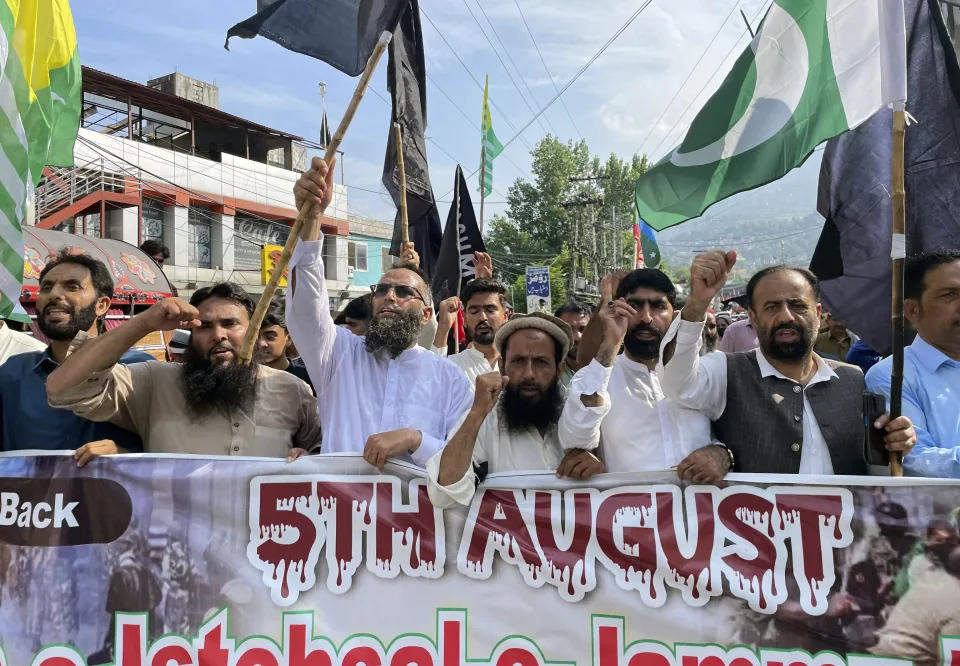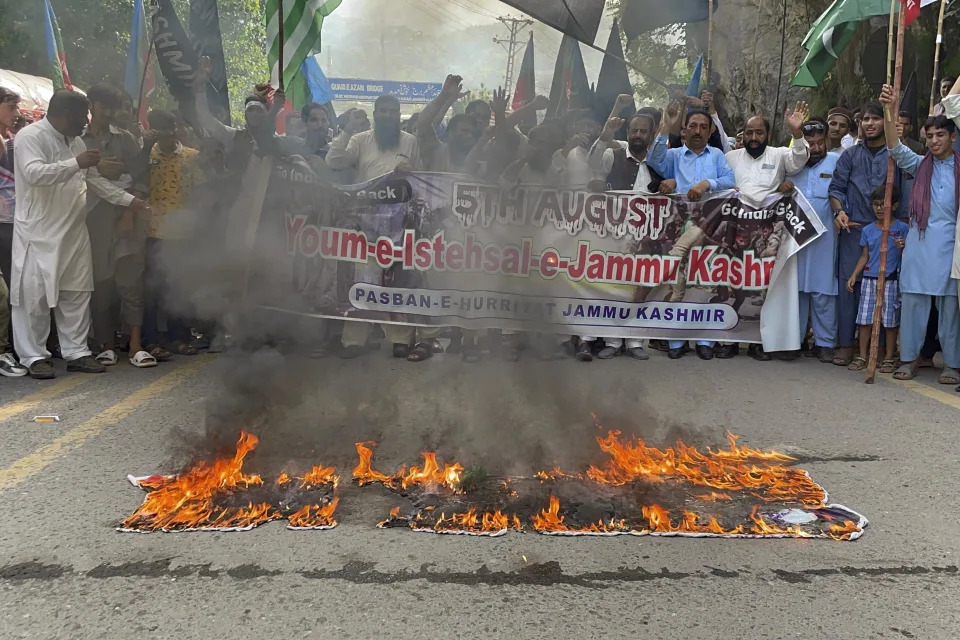Associated Press
Updated Mon, August 5, 2024








In this handout photo released by the Pakistan Foreign Ministry, Deputy Prime Minister Ishaq Dar, center, addresses a crowd of people to show solidarity with the Kashmiri people on the eve of the fifth anniversary of India's decision to revoke the disputed region's semi-autonomy, in Islamabad, Pakistan, Monday, Aug. 5, 2024.
(Pakistan Foreign Ministry via AP)
MUZAFFARABAD, Pakistan (AP) — Hundreds of angry people took to the streets in Pakistan-administered Kashmir Monday to mark the fifth anniversary of India's decision to strip the disputed region of its semi-autonomy and take direct control of it.
The decision— which Islamabad insists was unilateral and violated United Nations resolutions — has tested the already strained ties between the two countries.
Protesters in Muzaffarabad, the capital of Pakistan-held Kashmir which is split between Pakistan and India and claimed by both in its entirety, burned an effigy of the Indian Prime Minister Narendra Modi and Indian national flags, vowing to fight New Delhi's decree until its dissolution.
Another protest of about 200 people was led by Deputy Prime Minister Ishaq Dar in the capital.
Pakistan’s Prime Minister Shehbaz Sharif addressed lawmakers in Muzaffarabad, via a video feed, saying he hoped Kashmiri people would soon get the right to self-determination to decide their future and expressed his optimism that “that day will soon come.”.
Earlier, in a statement, he called to resolve the tense territorial dispute over Kashmir through the diplomatic channels of the U.N., saying Pakistan will continue to “extend its strong moral, political and diplomatic support to the Kashmiri people.”
In 2019, India’s Hindu nationalist-led government revoked the special status of Muslim-majority Kashmir after cutting off communications and deploying thousands of troops in the restive Himalayan region amid uproar from Pakistani lawmakers.
In December, India’s top court upheld the decision by Modi’s government.
The future of Muslim-majority Kashmir was left unresolved at the end of British colonial rule in 1947 when the Indian subcontinent was divided into predominantly Hindu India and mainly Muslim Pakistan. Pakistan has long pushed for the right to self-determination under a U.N. resolution passed in 1948, which called for a referendum on whether Kashmiris wanted to merge with Pakistan or India.
The rebels in Indian-administered Kashmir have been fighting Indian rule since 1989.
MUZAFFARABAD, Pakistan (AP) — Hundreds of angry people took to the streets in Pakistan-administered Kashmir Monday to mark the fifth anniversary of India's decision to strip the disputed region of its semi-autonomy and take direct control of it.
The decision— which Islamabad insists was unilateral and violated United Nations resolutions — has tested the already strained ties between the two countries.
Protesters in Muzaffarabad, the capital of Pakistan-held Kashmir which is split between Pakistan and India and claimed by both in its entirety, burned an effigy of the Indian Prime Minister Narendra Modi and Indian national flags, vowing to fight New Delhi's decree until its dissolution.
Another protest of about 200 people was led by Deputy Prime Minister Ishaq Dar in the capital.
Pakistan’s Prime Minister Shehbaz Sharif addressed lawmakers in Muzaffarabad, via a video feed, saying he hoped Kashmiri people would soon get the right to self-determination to decide their future and expressed his optimism that “that day will soon come.”.
Earlier, in a statement, he called to resolve the tense territorial dispute over Kashmir through the diplomatic channels of the U.N., saying Pakistan will continue to “extend its strong moral, political and diplomatic support to the Kashmiri people.”
In 2019, India’s Hindu nationalist-led government revoked the special status of Muslim-majority Kashmir after cutting off communications and deploying thousands of troops in the restive Himalayan region amid uproar from Pakistani lawmakers.
In December, India’s top court upheld the decision by Modi’s government.
The future of Muslim-majority Kashmir was left unresolved at the end of British colonial rule in 1947 when the Indian subcontinent was divided into predominantly Hindu India and mainly Muslim Pakistan. Pakistan has long pushed for the right to self-determination under a U.N. resolution passed in 1948, which called for a referendum on whether Kashmiris wanted to merge with Pakistan or India.
The rebels in Indian-administered Kashmir have been fighting Indian rule since 1989.
No comments:
Post a Comment